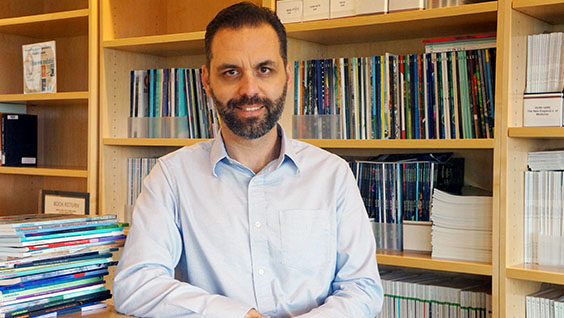A few weeks ago, we announced that our former Sanford-Burnham postdoctoral fellow, George Kyriazis, PhD, was joining the Institute’s Orlando campus as a faculty member. We sat down with George last week to discuss his background, research interest, and life outside of work.
George, please tell us about yourself. Where are you from? Where did you attend school? What were your majors, and minors?
I was born and raised in Athens, Greece, and attended the University of Athens, majoring in Exercise Science and later in Nutrition. I came to the U.S. to pursue graduate studies in Clinical Exercise Physiology but majored in Molecular Biology and Microbiology at the same time at the University of Central Florida, where I later received a PhD in Biomedical Sciences.
When did you join Sanford-Burnham and why did you pick the Institute?
I first joined Sanford-Burnham at Lake Nona in the summer of 2008 (actually our current building was not up yet!) as a postdoctoral fellow in the Tyrberg lab. I have had an interest in metabolism since my undergraduate studies, so the Diabetes and Obesity Research Center provided an excellent training opportunity.
You were recently appointed to the faculty at our Lake Nona campus. Can you tell us what this role entails?
I was appointed an assistant professor in the Metabolic Disease Program to pursue my independent research. I am also a member of a newly formed team of investigators – the EndoMetabolic Research Group – along with Richard Pratley, MD, and under the leadership of Timothy Osborne, PhD We have put together a collaborative translational lab that aims to conduct research into the role of the gut to bridge basic discoveries with the clinic. We are specifically interested in understanding how differences in dietary composition change the way by which nutrients are sensed in the gut, leading to the development of metabolic disease.
What is your research focus? How did you end up in this field?
I am interested in understanding the role of novel nutrient receptors in metabolism. Typically, nutrients enter cells to be metabolized. However, cells also possess nutrient sensory mechanisms that do not require their uptake. This sensory mechanism is mediated by specialized nutrient receptors found at the cell’s surface, but their role is not entirely clear. During my postdoctoral tenure at Sanford-Burnham, we discovered that sweet-taste receptors, that traditionally sense sweetness on your tongue, are also expressed in pancreatic beta-cells where they play an important role in the regulation of insulin secretion. We have recently expanded these observations and have unveiled a role of these receptors in the gut and muscle where they regulate nutrient metabolism.
You are also working at the Florida Hospital – Sanford-Burnham Translational Research Institute for Metabolism and Diabetes (TRI-MD) – how does that help your research?
Yes. I have been an investigator at the TRI-MD over the past couple of years and I continue in the same role. This is an excellent opportunity for developing a comprehensive research program. Practically, discoveries at the bench can be tested as a proof-of-concept in humans and we can understand their relevance and impact on human physiology and disease. This is a dream come true for an investigator aspiring to develop a translational approach.
Tell us a little about the George outside of work? What do you enjoy doing when you’re not working?
When I am not mentally and physically occupied by research, I live a rather normal life in downtown Orlando. I enjoy working out, live music, and interesting conversations over drinks.
What is your favorite book and why?
It is tough to pick one favorite. I usually read books about philosophy, politics, science, and classical literature. “Consciousness Explained” by Daniel Dennett is a recent favorite, dealing with mysteries of the brain and explains how consciousness emerges based on scientific evidence. “The Myth of Sisyphus” by Albert Camus is another unforgettable classic.
Do you have any advice for people who want to become a researcher?
It is the three “Ps.” Be passionate, persistent, and patient. There are no instant rewards in research but with a lot of hard work and a little bit of luck, it can be very satisfactory.
